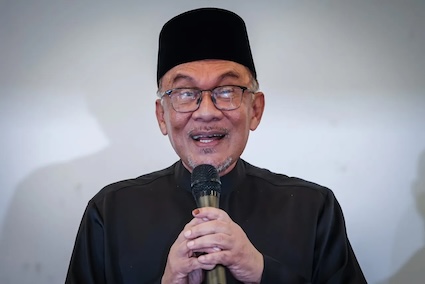The PM is still incarcerated, isn’t he?

This time round, Anwar Ibrahim is in the shackles put in place by his own ‘unity government’ partners.
Shankar R. Santhiram, FMT
Having spent so many years being incarcerated for reasons best known to Dr Mahathir Mohamad and the motley crew of his successors, Anwar Ibrahim finally became prime minister exactly a year ago, today – this, too, after a series of twists and only after our king stepped in.
Because of the inconclusive results of the last general election, and without a clear mandate, the prime minister had to reach out to his political rivals and do some horse-trading before he got appointed to the top job.
It was only after Umno (read: Ahmad Zahid Hamidi) finally backed him that the powerful East Malaysia bloc joined in and gave the prime minister the majority he needed to be appointed to the country’s top job.
From 1998 when he first got the boot as the deputy prime minister, to launching the “reformasi” movement, to forming his multiracial PKR party, and then being sent to prison on two occasions, our current prime minister stood head and shoulders above all the other Malaysian politicians for his reform agenda.
In opposition, he championed institutional reforms and was the flag-bearer for the anti-corruption brigade in the country. On the international stage, he positioned himself as a moderate Muslim leader with vision and poise. His combative oratory skills held him in good stead, and his penchant for being savvy and stylish continues even today.
I have been in the crowd when he gave his political speeches. He electrifies his audience with his communication skills, affable nature, and emotional narratives.
But 12 months ago, against the backdrop of the general election stalemate, the prime minister was required to make concessions. His government had to include those who were far from reform-minded, and composed of compromised people.
The political elites were back, and this in turn emboldened the all-powerful civil service in the country. The prime minister had to regularly reassure the country’s top civil servants that he appreciated them. In layperson’s terms, the prime minister just told the civil service to relax, and it would be business as usual.
His corruption crusade slowed down. Naturally, having a deputy with many allegations didn’t augur well for him. Even his coalition partners, who declared up to the eve of the last general election that they would not work with Umno, had to put their tails between their legs and toe the line.
The perceived fundamentalist Islamic threat that the opposition brings to the table has made the prime minister scramble to appease the Islamists in the country. More funds have been allocated to the religious department. And, to top that, this department has been given a wider scope to intervene with the new government’s policies.
Through all of this, the prime minister has had to shore up his own Islamic credentials. We can see this from his attire, to him presiding over conversions, and now being front and centre in championing the Palestinian cause.
Having chided previous administrations for offering plum GLC jobs to their supporters, our prime minister now has to do the same. Appointments to various cushy jobs that pay out huge sums are given not for the candidate’s track record or ability to navigate that government enterprise; instead, it is offered for continued political support.
For years in opposition, the prime minister asked for open government and demanded that the mainstream media be independent. Today, online news portals are being shut down and the same archaic argument is being used that the preservation of national stability requires censorship.
The compromised cabinet that the prime minister leads has not performed in the last year. Granted, there are ministers who get on with the job at hand. But there are just a handful who do this. The bulk of the appointments have made some staggeringly mind-boggling gaffes.
The first murmurs of a cabinet reshuffle emerged some months ago. But the prime minister has not, or perhaps cannot, pull the trigger and shuffle his cabinet because of the political reality of a compromised government.
At the recent Apec CEO summit in San Francisco, our prime minister quoted Winston Churchill who apparently said that a statesman plans for the next generation, but a politician only plans for the next election. When further pressed by the interviewer, the prime minister replied that if he only thinks of the next generation, he will lose the next election.
This is the quandary we have in Malaysia.
Successive bad decisions by previous administrations have led to clear socio-economic-cultural problems in our country. To clean up and put the country back on track for good governance, moderate religiosity, economic growth, cultural advancement, progressive education, and stable race relations, we need politicians who can think and plan for the next generation.
Plotting these long-term plans involves making tough decisions, a transparent government, and stepping away from a parochial mindset. But, as our prime minister said so eloquently, planning for the next generation might lose him the next election.
Anwar Ibrahim, being a consummate politician, is only planning for the next election. And, notwithstanding his nearly 25-year crusade for reforms, ultimately our prime minister is just a politician.
The political concessions he has made in the last year clearly demonstrate that the prime minister is still incarcerated. But this time around, he is not incarcerated in a physical prison – rather, it is in the shackles placed by his own “unity government” partners and his lack of gumption to see beyond the next election.

